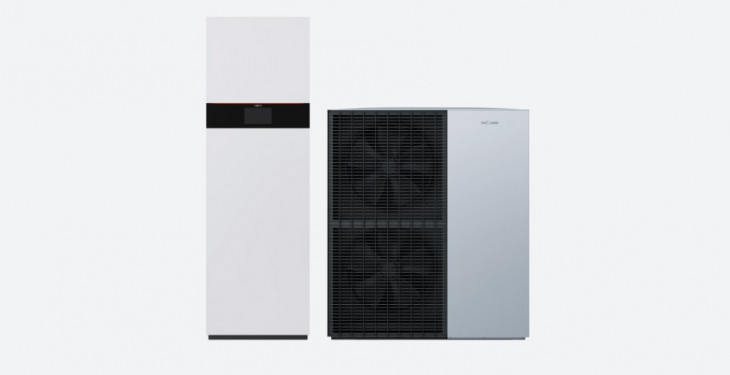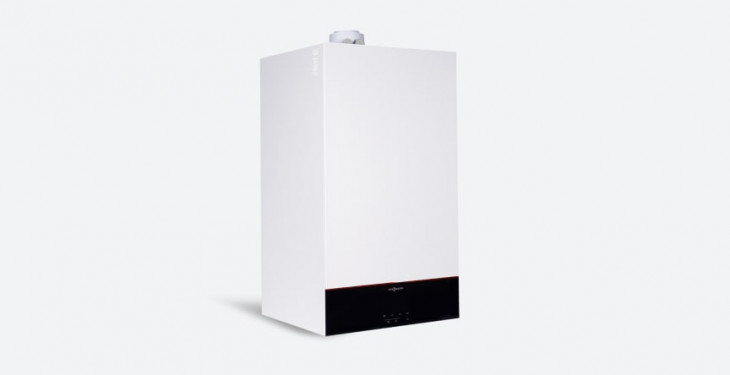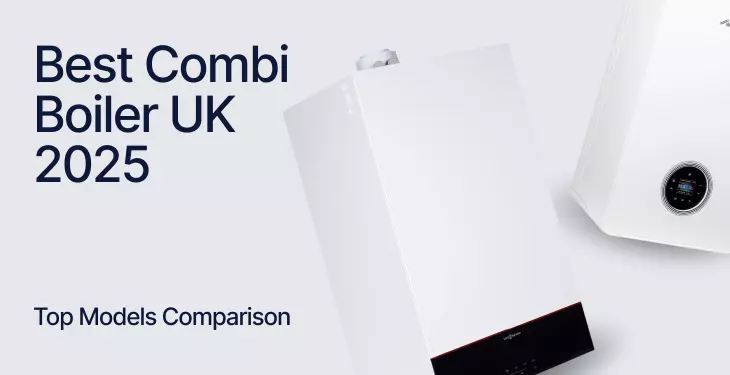Updated: 30th May, 2025

If you’re struggling to decide between an air source heat pump or a new gas boiler to upgrade your heating and hot water production, your property could be answering the question already.
Try a new boiler quote, save up to £340 per year (0% APR available).
In this blog we’re going to be exploring if your home and the area it’s in has already provided the invaluable instruction as to what type of heating system it most requires, an air source heat pump or new gas boiler?
An air source heat pump works by absorbing heat energy from the outside air into a fluid. The fluid is then passed through a heat exchanger and into a heat pump, this raises the temperature and then transfers the resultant heat into water.
The hot water is then transported through pipework into radiators or underfloor heating in order to warm the rooms within a property.

Undoubtedly air source heat pumps when deployed in certain settings can provide an owner with long term savings and returns due to their efficiency, but not every home is compatible with this type of heating system.
If the intended location for an air source heat pump doesn't have sufficient insulation, the heat generated from the pump would be lost, wasting energy and money.
Loft and cavity wall insulation can considerably bump up the cost of a heat pump installation, costing well into the hundreds and possibly even thousands of pounds, thus potentially negating any long term savings that homeowners would be looking to make.
Often, heat pumps are far less effective in colder regions or areas. They can technically function at temperatures as low as -20°C, but any time the temperature outside is below 0°C their efficiency begins to dwindle.
The last thing you’d want is for an expensive heat pump to provide a sub-optimal performance on a freezing winter day, especially if it’s your primary source of heat and hot water.
Another factor to this thread is that a heat pump generates a lower level of home heating and temperature regulation.
Heat pumps often provide an output of around 55°C, comparatively low as a modern efficient combi boiler is in the range of 70°C-85°C!
The lower temperature performance may not be what many homeowners and their families are accustomed to and may not heat their property as thoroughly.

While most air source heat pumps are fairly compact units in their external casing, some style of properties like terraced housing, with reduced or no back garden space wouldn’t provide an ideal, or in some cases legal external surface for installation.
Although most air source heat pumps do not require active planning permission to be installed, there are some regulations that must be adhered to prior to any installation.
These include making sure the installation is at least 1 metre away from the property boundary, is installed on a suitable surface, has a specific max volume and will be used for heating only.
In short, any style of home can be fitted with and heated effectively by a gas boiler, it’s the variety of gas boiler that would be the deciding factor.
The three main types of gas boiler - combi, system and heat only (regular) each come with their own benefits and are equally suited to heating different types of properties.

Combis or combination boilers, combine all components and aspects of a heating system (central heating and hot water production) into one succinct and powerful unit.
Their economic size, quick flow rates and dual functionality means combis are extremely efficient and effective when heating a multitude of property sizes, being best suited for small to medium sized homes with 1-2 bathrooms.
System boilers perform best in homes with a high hot water demand, specifically either larger properties with a higher number of residents or properties with two or more bathrooms.
System boilers store hot water in a separate cylinder which provides constant flow access but requires additional (minimal) storage space.
System boilers can service multiple flow outlets at one time, meaning no one in a larger home would be standing around waiting for a shower.
A heat only boiler provides the heat for a home's central heating system and hot water cylinder. A heat only boiler is suited to servicing larger properties with multiple bathrooms/radiators or a business premises with a high water demand.
Heat only boilers do require sufficient installation space within a property, as they use two storage tanks (feed & expansion) as well as the aforementioned hot water cylinder.
Although a combi is generally considered more space saving, a modern heat only boiler is still compact and can supply more bathrooms with hot running water than a combi can.
All things considered, an air source heat pump can be advantageous in terms of reduced energy outgoings, but only if the property and surrounding conditions are befitting.
In an environment not particularly conducive to its functionality, this type of heat pump may not be suitable for every home.
Despite the confusion regarding the 2025 new build gas ban, there is no actual legal onus to replace your gas boiler or preventive measures to stop you getting a modern and efficient gas boiler installed.
This could mean a new gas boiler may be the more viable option to provide satisfactory heating for your property.
Here at iHeat, we stock a massive range of the newest and most advanced home heating systems, including sleek and efficient combi boilers.
With an online free quote, fixed price guarantee and next day installation available, now might be the perfect time to upgrade your home’s heating system.
Get a quote in 60 seconds, fitted as fast as next day!
0% APR finance available.
A combi boiler is better for instant hot water and smaller homes with limited space, providing a compact and immediate solution. A heat pump, on the other hand, is more energy-efficient and environmentally friendly, making it a better choice for those prioritizing sustainability. Your decision should consider your needs for convenience versus long-term efficiency and environmental impact.
Yes, heat pumps are generally cheaper to run due to their higher efficiency, as they convert more energy into heat compared to boilers. However, the savings will depend on energy costs, your home’s insulation, and the specific efficiency of the heat pump and boiler in use.
Yes, a heat pump can replace a combi boiler, but it may require significant modifications to your home, such as improved insulation and upgraded radiators. Heat pumps operate at lower temperatures, so these changes are necessary to ensure efficient operation and comfort.
Install a gas boiler if you are looking for lower upfront costs and a straightforward installation. Opt for a heat pump if you are focused on long-term energy savings and environmental benefits. Consider your budget, home insulation, and sustainability goals to make the best decision for your needs.
Switching from a boiler to a heat pump can be beneficial for reducing carbon emissions and long-term energy costs. However, this switch may involve high installation costs and necessary modifications to your home. Carefully evaluate the potential savings and benefits against the upfront investment and changes required before making the switch.
Heat pumps are worth it in the UK due to their efficiency and environmental benefits, particularly with available government incentives. They are best suited for well-insulated homes where long-term savings can offset the higher upfront costs. Consider your home’s insulation and energy needs to determine if a heat pump is a good fit.
Heat pumps have several downsides, including:


29th September, 2025
Here’s a quick roundup of the best combi boilers for 2025.
 Read Article
Read Article

24th September, 2025
Looking for the most reliable boiler brands? Check out our comprehensive guide that compar...
 Read Article
Read Article

24th September, 2025
iHeat's guide to the best boilers for big families and larger properties. We explain the d...
 Read Article
Read Article